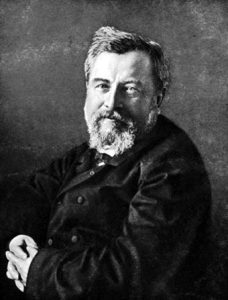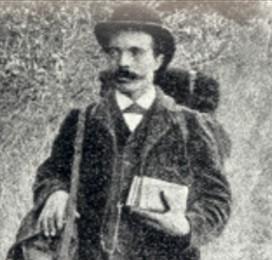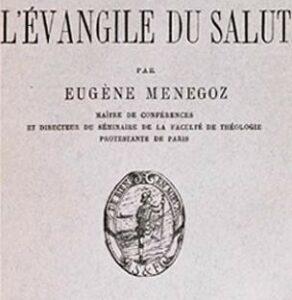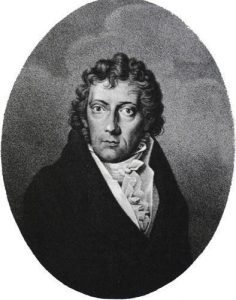Professor of Dogmatics
Auguste Sabatier, pastor and reformed theologian, was called by some « the greatest French theologian since Calvin ». His extensive biography, written by F. Laplace and reproduced by A. Encrevé in Les Protestants (1993) can be summed up as follows :
The career of A. Sabatier. He was born in the Ardèche départment into a family of small shopkeepers greatly influenced by the ideals of the Revival. He attended the secondary school Institution Olivier de Ganges (Hérault) where, with a few friends, he founded a “Christian Association”. He registered at the Theological Faculty of Montauban. He travelled to Bale , Tübingen and Heidelberg (1863-1864). He was appointed as pastor in Aubenas (1864-1868).
In 1868 he is elected Professor of Reformed Dogmatics at the Strasbourg Faculty of Theology. He is the candidate of the orthodox wing(or evangelicals). Following the annexation of Alsace-Lorraine, he was expelled from the Faculty, and then from Alsace ; he left Strasbourg in 1873.
In Paris, he actively collaborated in establishing the Protestant Theological Faculty in Paris (Decree of 27 March 1877). He was once more called to the chair of Reformed Dogmatics, which he was to teach until his death. In 1895 he was appointed Dean of the Faculty. Meanwhile, in 1886, he was appointed deputy Head of the religious science department of the Ecole Pratique des Hautes Etudes ; he was also in charge of a course on Christian Literature.
He actively contributed to numerous magazines and newspapers ; he was in charge of the Sunday school at the Eglise Réformée de l’Etoile.
His work was mainly centred on the links between theology and culture and likewise on what can undo them : the gap between science and faith, between dogmas and the autonomy of conscience, the contradiction between the rigidity of dogmas and the constant evolution of the world. Following in the footsteps of Schleiermacher, Sabatier maintained that, since dogmas have their origins in religious feeling (and not the opposite), since the expression of this feeling varies according to cultures, dogmatics may be understood as the history of the expression of religious feeling, and is consequently a part of historical science. Religion taken as a spiritual experience is informed internally by psychology and externally by history. Theology is therefore a religious science and thus has its place in culture. But his new approach is in no way reductive of what is specifically biblical : indeed, the spiritual experience of Jesus, who was conscious of being the son of God, has reached the unequalled and incomparable heights of holiness.
The transformation of traditional dogmatics into a science of religious experience leads to a new concept of religious knowledge. Such knowledge is essentially symbolical because, as organisms and language are living elements, religious symbols likewise evolve and replace one another while expressing the same fundamental experience. The only acceptable standard for assessing other symbolic systems is the Biblical language, because in the Bible the believer finds the living Christ. This concept is close to that of Ménégoz and the name of symbol fideism is closely tied to the association of these two authors.
Sabatier's republican action
He played an important role in the relations between French Protestantism and the French Republic. By presenting theology as a history or a sociology of religion, Sabatier justified the existence of a Protestant Theological Faculty in the French system of higher education, as well as the participation of Protestant theologians in the work of the newly-founded department of “Religious Science” at the Ecole Pratique des Hautes Etudes.
In the context of increased confrontation between “seculars” and “clericals”, his preference for a “religion of the spirit” allowed Sabatier to make a firm distinction between Protestantism and the “authoritarian religion” of Roman Catholicism – without ever abandoning his respect for people (e.g. of Pope Leon XIII). For Sabatier, the alliance between Protestantism and the Republic is an objective one. The transfer from Strasbourg to Paris of the Faculty of Protestant Theology, mostly due to his efforts, was felt by the Protestant community as the official acknowledgement of their patriotism.
Passionately attached to the person of Jesus-Christ while respecting the rights of historical criticism, Sabatier maintained that the secret of the existence of Jesus escapes us both in its origin and in its end. For Sabatier, such a tribute to Jesus was not so much the witness brought by a single individual as the Confession of the whole Church. This is why he always insisted on remaining above the problems of the Church and of partisan quarrels, and this was proved by his attempts at reconciliation after the national synod of 1872. His opposition to formalism and dogmatism was a leading force in his life.





